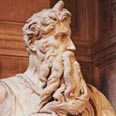No figure in Jewish annals compares with Moses.
He "changed the course of human history all by himself," Rabbi Norman J. Cohen writes enthusiastically in Moses and the Journey to Leadership, one of those inspirational books built around biblical personalities.
"He is the founder of the nation, a revolutionary, a lawgiver, a priest, a judge, a politician, a teacher, a prophet, a comforter and a guide - all rolled up into one. He is the paradigm for all subsequent leaders, for all of us."
But a Cohen colleague at Reform Judaism's New York City seminary, Rabbi S. David Sperling, isn't certain that Moses even existed or, if he did, whether the Bible provides much reliable information about him.
Sperling contends that if traditional accounts of the origins of Judaism had not recorded a founder, "analogy would have required postulating him; and that is probably what happened" when ancients wrote the Bible.
That's one of the more important assertions in the newly issued second edition of the Encyclopaedia Judaica (Macmillan Reference, 22 volumes, USD 1,995). Of the monumental work's 21,000-plus articles, 2,600 are new and nearly half were updated from the 1972 original.
Historical character?
The introduction to Moses' life says "we cannot really reconstruct a biography of Moses. We cannot even be sure that Moses was a historical character." The 1972 edition was less skeptical.
Not that the second edition's attitude is odd in academic or Jewish intellectual circles nowadays. Conservative Judaism's official Torah commentary (2001) says that what should concern Jews is "not when, or even if, Moses lived, but what his life conveys in Israel's saga." It calls Moses a "folkloristic, national hero."
This fading Moses, of course, departs radically from long-standing tradition. The "13 Principles" of the revered 12th century sage Maimonides, for example, insisted that Moses lived as Judaism's supreme prophet through whom God gave the Torah. And the Book of Exodus, of course, recounts Moses' career in considerable detail.
Orthodox Judaism further believes that Moses' last will and testament in Deuteronomy affirms his role in writing the Bible's first five books and that he provided authoritative oral interpretations of these Scriptures.
Sperling, however, writes that the biblical story of Moses' birth "contains generic elements that are discounted by historians" and echo pagan legends. He deems passages on early adulthood "historically unverifiable" and says the exodus account was "dramatically woven out of various strands of tradition."
He thinks the credibility of the wilderness wanderings is undercut by discrepancies in the story and lack of confirmation from archaeology.
'True, unless conclusively disproved'
This treatment omits elaboration of opposite reasoning among Orthodox Jewish scholars, admittedly a minority.
Orthodox Rabbi Shalom Carmy of New York's Yeshiva University grants that historians have so far found no documentation on Moses apart from the biblical writings. He doesn't find this gap surprising and says scholars who make that argument fail to acknowledge that evidence corroborating ancient texts is very spotty.
Summarizing the Jewish divide, Carmy observes that liberals hold the biblical text "doubted until independently proven true," while for fellow traditionalists "it is true unless conclusively disproved."

Existed? Moses
Photo: Getty Image
מומלצים















